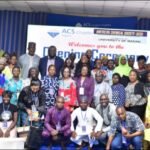Justice John Tsoho, the Chief Judge (CJ) of Federal High Court (FHC) of Nigeria, on Monday, said judges of the court would not be cowed by petitions borne out of malice in justice delivery.
Tsoho, who stated this during the special court session to mark the ceremonial commencement of the FHC 2024/2025 Legal Year in Abuja, decried undue attacks on judges in the media.
“It is very concerning that the common situation these days is that some parties after appealing the decision of a judge, proceed to petition the NJC (National Judicial Council) on the same issue.
“The question then is: Which of the steps taken does that party accord priority to? This attitude reflects nothing else but malice.
“Judges will not be cowed by such antics. Worse still, some discuss pending cases in the media, notwithstanding that such cases are sub-judice,” he said.
He condemned the increasing cases of unwarranted attack on judicial officers for performing the lawful duties.
He blamed the development on some lawyers and their clients, urging the Nigerian Bar Association (NBA) to work on ways to sanction erring members, failing which judges should deploy their powers under the law.
He accused lawyers, some of whom are senior advocates, of yielding themselves as tools to greedy politicians in seeking to manipulate the legal process by resorting to blackmail and name calling when their clandestine overtures are rejected.
“I am compelled to seriously deprecate the current pervading attitude of some lawyers, litigants and public commentators, of launching virulent attacks in the media, against judges and their decisions.
“The Federal High Court regrettably, has been worse for it, arising from its wide territorial and vast subject matter jurisdiction.
“This trend seems to have become a ready means of seeking fame, employed mostly by failed lawyers and litigants.
“They do not realise that the field of law and indeed adjudication, is not a pedestrian affair.
“I wish to use this rare opportunity of voicing out, which comes just once in a year, to comment at length on this canker, as it poses great danger, not only to the Nigerian judiciary, but the rule of law generally,” he said.
Justice Tsoho said that it had become dangerous and worrisome that people now abandon the legally recognised means of challenging court decisions and instead, resort to mob-mentality.
According to him, it is more so, as those promoting it are not well-informed, but act in concert with some disgruntled lawyers.
“It is very sad that certain lawyers, with a few senior lawyers among them, have willingly offered themselves as errand boys to some politicians to malign judges.
“They secretly seek to influence judges, but hypocritically turn round to condemn judges, when their clandestine overtures to judges are rebuffed.
“In such situations, their supposition is that the judge must have been compromised by the opponent.
“They merely appear sanctimonious, while levelling unfounded allegations of bribery against judges, in
humongous sums of money.
“None of them has ever proven such allegations, but nevertheless, succeed in inciting the gullible society against the maligned judges.
“It is bad enough that they mostly use faceless media platforms to orchestrate their malicious campaigns.
“They publicly advertise their ignorance by vociferously calling for the immediate ‘sack’ of judicial officers, as if the officers are mere domestic staff.
“They are oblivious that the appointment of judicial officers has statutory flavour and they cannot be removed, unless there is proven case of serious misconduct.
“The ugly trend must be halted, if the judiciary is to survive. This is a task for well-meaning members of the legal profession, who owe their lives to the profession.
“For the greedy and shameless renegades however, the collapse of the legal profession itself will not make any difference, as they would readily survive by touting.
“At this juncture, we call on the Nigerian Bar Association to scrutinise its ranks and uproot the misfits, who are causing incalculable damage to the legal profession,” he said.
On what options exist for judicial officers who are unduly maligned, Justice Tsoho said: “We wish to further draw attention that there are extant laws that can be called in aid to check the malicious tendency.
“Both the Criminal Code and the Penal Code provide punishment for malicious or injurious falsehood. For lawyers, the Rules of Professional Conduct can apply.
“On the part of judges, there is crying need to revive exercise of the power of contempt to protect the integrity of their persons and the courts.
“Their reluctance to employ this potent weapon should not be seen as a sign of ignorance or cowardice,” he said.
The CJ, who said that it was not unusual for litigants to be dissatisfied with court’s decisions, said the realisation informed why lawful avenues were created in the constitution to challenge court’s rulings or judgments.
He said: “Firstly, we need to remind ourselves that courts of law are established by the constitution of the Federal Republic of Nigeria, the supreme law of the land and are vested with judicial powers by Section 6 thereof.
“Similarly, judges, particularly of the superior courts of record, are appointed pursuant to the provisions of the constitution and are obligated to discharge their duties in accordance with the constitution and enabling statutes.
“Secondly, there exists the hierarchy of courts, which serves to scrutinise the adjudicatory role of the courts, in ascending order.
“Thus, appeals lie from the High Courts to the Court of Appeal and ultimately to the Supreme Court of Nigeria.
“Consequently, litigants who are dissatisfied with decisions of lower courts are expected and indeed required to express their grievance through the appeal process.
“The right of appeal is constitutionally guaranteed, with regard to both civil and criminal litigation. The essence of this narration is to demonstrate that the legitimate manner of challenging a court decision is through the appeal process.
“If however, a litigant genuinely and strongly feels that a judge has misconducted himself in handling the case, such litigant may then quietly make a written complaint to the NJC for redress.
“There is hence no room in law, for holding press conferences to criticise judicial decisions.
“The implication therefore, is that those who attack decisions of judges in the press are neither lawyers nor law-abiding, but violators of law.
“It is significant to stress the point that the existence of the appeal structure itself admits of the diverse nature of opinions and thoughts in society, which could occur in the decision-making process.
“Therefore, it is not a crime that there could be concurring or divergent views of superior courts on a decision made by a judge.
“That our decisions are not final, is a blessing. With the industry and brilliance of our judges, appeals are welcome to test the veracity and tenacity that distinguishes our judges.”










